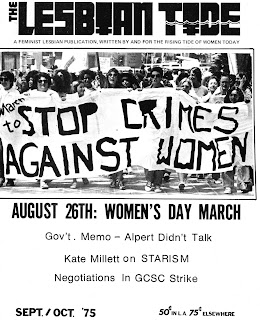 The Lesbian Tide had very colorful covers even when they were in monochrome. Doesn't this cover make you want to read what's inside - even today ... and be one of the 2,000 women who showed up on the campus of UCLA, April 17, 1973?
The Lesbian Tide had very colorful covers even when they were in monochrome. Doesn't this cover make you want to read what's inside - even today ... and be one of the 2,000 women who showed up on the campus of UCLA, April 17, 1973?Posted by ANG
NOTES FROM A COMMUNITY ORGANIZER
 The Lesbian Tide had very colorful covers even when they were in monochrome. Doesn't this cover make you want to read what's inside - even today ... and be one of the 2,000 women who showed up on the campus of UCLA, April 17, 1973?
The Lesbian Tide had very colorful covers even when they were in monochrome. Doesn't this cover make you want to read what's inside - even today ... and be one of the 2,000 women who showed up on the campus of UCLA, April 17, 1973? If you ask the average feminist of 2008 if the world has changed much in the past 30 years she will likely say, "No." When it comes to violence against women, not much has changed as all.
If you ask the average feminist of 2008 if the world has changed much in the past 30 years she will likely say, "No." When it comes to violence against women, not much has changed as all.